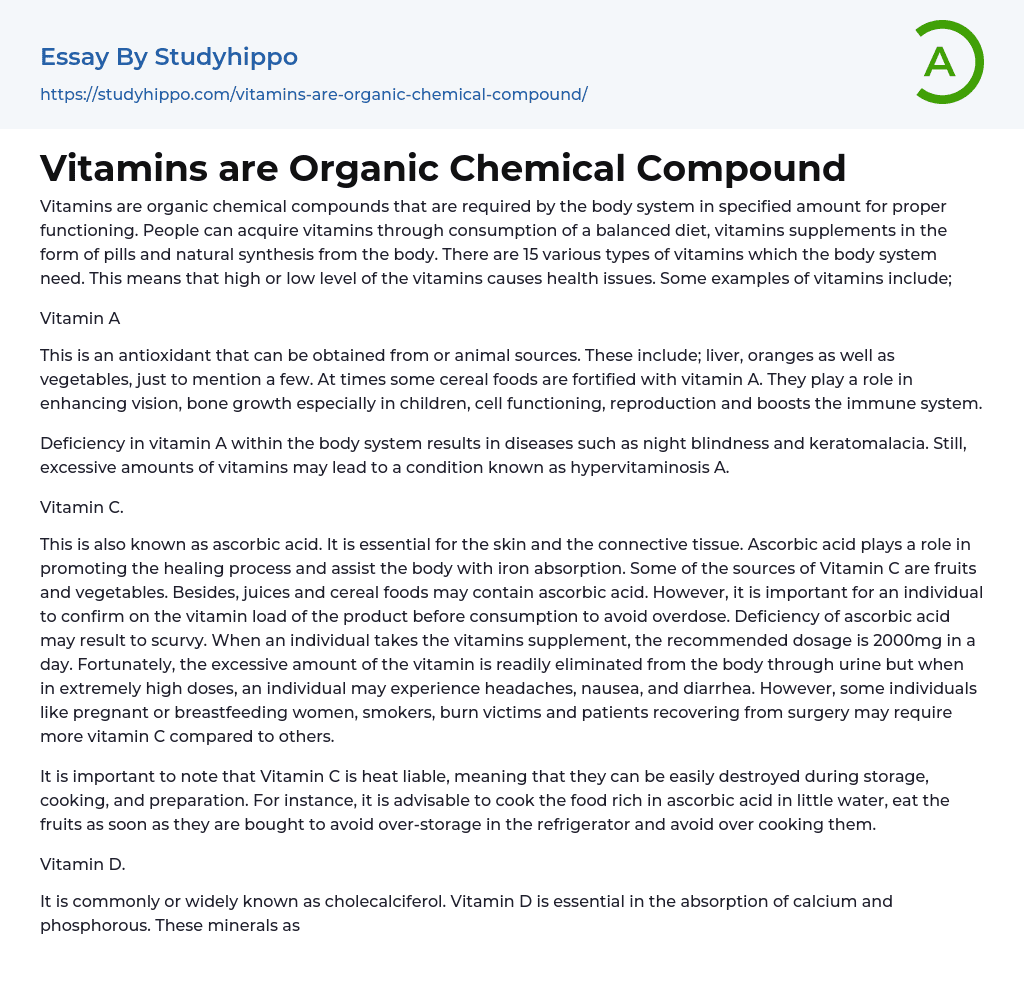Vitamins are organic chemical compounds that are required by the body system in specified amount for proper functioning. People can acquire vitamins through consumption of a balanced diet, vitamins supplements in the form of pills and natural synthesis from the body. There are 15 various types of vitamins which the body system need. This means that high or low level of the vitamins causes health issues. Some examples of vitamins include;
Vitamin A
This is an antioxidant that can be obtained from or animal sources. These include; liver, oranges as well as vegetables, just to mention a few. At times some cereal foods are fortified with vitamin A. They play a role in enhancing vision, bone growth especially in children, cell functioning, reproduction and boosts the immune system.
Deficiency in vitamin A within the body system results in diseases s
...uch as night blindness and keratomalacia. Still, excessive amounts of vitamins may lead to a condition known as hypervitaminosis A.
Vitamin C.
This is also known as ascorbic acid. It is essential for the skin and the connective tissue. Ascorbic acid plays a role in promoting the healing process and assist the body with iron absorption. Some of the sources of Vitamin C are fruits and vegetables. Besides, juices and cereal foods may contain ascorbic acid. However, it is important for an individual to confirm on the vitamin load of the product before consumption to avoid overdose. Deficiency of ascorbic acid may result to scurvy. When an individual takes the vitamins supplement, the recommended dosage is 2000mg in a day. Fortunately, the excessive amount of the vitamin is readily eliminated from the body through urine but when in extremely high doses
an individual may experience headaches, nausea, and diarrhea. However, some individuals like pregnant or breastfeeding women, smokers, burn victims and patients recovering from surgery may require more vitamin C compared to others.
It is important to note that Vitamin C is heat liable, meaning that they can be easily destroyed during storage, cooking, and preparation. For instance, it is advisable to cook the food rich in ascorbic acid in little water, eat the fruits as soon as they are bought to avoid over-storage in the refrigerator and avoid over cooking them.
Vitamin D.
It is commonly or widely known as cholecalciferol. Vitamin D is essential in the absorption of calcium and phosphorous. These minerals assist in the formation and strengthening of the bone tissues. Some of the sources for Vitamin D include; Eggs, fish as well as sunlight and other fortified food products. Children require cholecalciferol more as they require it for growth and development. Vitamin D also play a role in enhancing the immune system, nerve, and the muscles. Deficiency results to rickets while excessive amounts within the body result to toxicity evident by organ damage and nausea.
Vitamin E.
Also referred as tocopherols play a role in various metabolic processes and enhancing the immune system by preventing cell damage due to free radicals. Vitamin E can be found in vegetable oils, nuts, and green vegetables and fortified foods. Fortunately, vitamin E is very rare in healthy individuals however in extreme cases deficiency may result in nerve and muscle damage.
B vitamins
Helps various metabolic processes that produce energy. Besides, they assist in the formation of red blood cells. They include; such as thiamine, riboflavin, vitamin B-6, B-12, folate, niacin, pantothenic
acid and biotin. Sources include; leafy vegetables, cereals as well as protein foods. Deficiency in vitamin B-6 also in B-12 can cause anemia.
Vitamin K:
Play a role in the production of blood clotting proteins. Sources for Vitamin K include; blackberries, liver, as well as leafy vegetables. Deficiency in Vitamin K may result in excessive bleeding. It is important to note that people ought to be careful and ensure that they get enough vitamin K especially when they take blood thinners.
In conclusion, Vitamins are essential for the body to work efficiently. However, people need to provide their body with the recommended daily intake of the compounds to avoid undesirable health effects due to overdose or deficiencies.
- Beef essays
- Beer essays
- Beverages essays
- Bread essays
- Burger essays
- Cake essays
- Coconut essays
- Coffee essays
- Cooking essays
- Crowd essays
- Cuisines essays
- Dairy essays
- Desserts essays
- Dinner essays
- Drink essays
- Fast Food essays
- Favorite Food essays
- Food Safety essays
- Food Security essays
- Food Waste essays
- Fruit essays
- Ginger essays
- Hamburger essays
- Ice Cream essays
- Juice essays
- Lemon essays
- Meal essays
- Meat essays
- Oreo essays
- Organic Food essays
- Pizza essays
- Rice essays
- Sainsbury essays
- Sugar essays
- Taste essays
- Tea essays
- Wine essays




